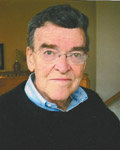July 5, 2012
Max’s Musings
 By Max Molleston
By Max Molleston
It was probably last month that I re-investigated my poetry library, a bookcase with six stacking shelves. I have lots of incoming poetry, but this treasure trove, 95 percent a gift from Dick Mackin of Bettendorf, contains thousands of poems and instructions on how to compose them, and on and on about poetry. From nowhere in particular, flops out this small volume titled Maverick Western Verse. Cowboy poetry, it is called. The tradition started on the ranges and moved indoors, and cowboy poetry has allowed the western reaches, particularly the rural lands to be presented in ways that don’t necessarily work on crop lands of middle America. I thought of my colleague Rick Haines, a farm broadcaster in the Montana west, who writes and cultivates ranch and range poetry. Here is a starter poem for us which is a reminder of the middle of the last century in rural reaches farmed in states like Iowa and Illinois. It’s titled:
Memories Of Three or Four
I remember being nestled in that old ranch kitchen,
deep in the warmth of washday Monday.
The Maytag’s liquid sound mixing with the gentle chugs
of the little gas engine, sloshing and chugging, sloshing
and chugging, as I curled up beside it
in the great pile of laundry rich with the smells
of the people I loved. Half asleep, half awake,
I floated there, all my senses safely cradled
and warmed and part of a rhythm and a sound like a
heartbeat in a womb.
Neil Meili is the poet of this and other verses in the book. I strongly recall the gas-engined Maytag, on my Uncle and Aunt’s back porch on an early farm of theirs in Wayne County, Iowa, and helping turn the hand crank to churn cream into butter. I was about six or seven then. Cowboy poetry, that is what we are featuring this July, as transplanted rodeos get staged in Iowa and Illinois, some on a grand scale. Lots of poems in the cowboy spirit concern themselves with friends and relatives, folks that have spent a lifetime on the range, and you with them, part of the time. Here’s one titled
UNCLE
He sips coffee, thick hands wrapped around the cup.
“This generation ain’t got no corner on violence.”
His sun-burned hands, cracked and broken, clench into
fists. “You’d be surprised how many fellas turned up in
their own wells in the Dirty Thirties.”
The drought was less severe, he says, here
where ranchers did not tear the sod with plows.
Most families had enough to eat.
His battered hands fixed fences, drove the teams swathing
hay, paid worn bills for the land of those who left.
Now, they call him a land baron. “Quitters,” he says.
“They gave up. But someone had to stay—-
and that took guts. Men like that had hot tempers,
and did their own law-making.”
Both of these poems not only represent the ranchers to the west, but also folks that didn’t succeed and those that did, farming the soils in the Midwest. A great portion of my life, is wrapped around farmers and their lives and my profession, too, as a farm broadcaster. This cowboy poety is not strange to me, and those of us with rural backgrounds. It is life in the raw with some refinements, like the Maytag gas-engined washer brought to us by farmer brothers around Newton, Iowa. Our volume this month, Maverick Western Verse was edited by John C. Dofflemeyer. We are thankful for his courage and caring attitude to gather with these men and women as they gather, and bring their work and worries to the pages for us to read. Get to that rodeo, when you have the chance. It is worth the time and effort.
Join me here in August and see what I come up with to get your attention.
Filed Under: Personal Growth
Tags: Back Porch, Bettendorf, Bookcase, Chugs, Cowboy Poetry, Cowboy Spirit, Crop Lands, Farm Broadcaster, Hand Crank, Liquid Sound, Mackin, Maytag, Meili, Middle America, Poetry Library, Rodeos, Stacking Shelves, Treasure Trove, Wayne County Iowa, Western Verse
Trackback URL: https://www.50pluslife.com/2012/07/05/max%e2%80%99s-musings-34/trackback/


